From Thursday, Mar 30, 2017
to Friday, Mar 31, 2017
Material Interactions Symposium
Thursday, Mar 30, 2017 - Friday, Mar 31, 2017
6:30 pm - 4:00 pm
Sciame Auditorium (Room 107)
141 Convent Avenue
New York, NY 10031
Thursday, March 30 | 6:30-7:30pm | Opening Remarks and Keynote Lecture
Friday, March 31 | 9:30am-4:00pm | Speaker Presentations and Panel Discussions
This event is free and open to the public.
For nearly three decades, architectural design strategies and methodologies involving modeling and making have been infused with processes that utilize digital design and fabrication technologies. The digital is no longer novel, but enmeshed within our daily lives in a post-digital culture. In more recent years, advances in materials, sensing, actuation, and robotic technologies, have altered the modes in which architects and designers engage spatiotemporal systems and human-machine-environment interactions. Novel architectures are being developed through innovative approaches in the design of responsive and adaptive systems that promote human interaction and result in corporeal, visceral, and ephemeral experiences. These kinetic, quasi-intelligent systems are being explored through emerging bio and synthetic materials, robotic systems, programmable matter, virtual environments, and deliberately altering, hacking, and tinkering with electronics.
Material Interactions, a symposium held at The City College of New York, Bernard and Anne Spitzer School of Architecture, will highlight current methodologies and question future potentials for sensing, actuation, and robotic technologies in the design of interactive systems. How will the continuation and evolution of adaptive and responsive behavior in design allow us to rethink the possibilities for exploring new territories in architecture, landscape architecture, urban design, and the environment? This symposium will bring together academics and practitioners to present and discuss current and future potentials for design processes that conflate technological prowess and playful experimentation as a means of interrogating, exploring, and discovering architectures and designs that posit new protocols in describing the relationships between bodies, machines, and environments.
Thursday, March 30, 2017
6:30–7:30 p.m, | Keynote Lecture: Bradley Cantrell, Responsive Landscapes: Curating Complexity
Friday, March 31, 2017
9:30 -10:00 a.m. | coffee and light breakfast
10:00-11:30 | Session 01 | Embedded Response
- Rashida Ng
- Nancy Diniz + Frank Melendez
- Dana Cupkova
- Moderator: Ruth Berktold
11:30-12:00 | break
12:00–1:30 p.m. | Session 02 | Networked Environments
- Phillip Anzalone
- Carla Leitao + Edward Keller
- Shawn Rickenbacker
- Moderator: Jeremy Edmiston
1:30–2:30 | lunch break
2:30–4:00 | Session 03 | Multi-Sensory Systems
- Jason Kelly Johnson
- Wendy W Fok
- Michael Szivos
- Moderator: Brian Ringley
Each session will consist of 15-20 minute presentations followed by a 20 minute moderated panel discussion
Phillip Anzalone | The New York City College of Technology / CUNY | Atelier Architecture 64
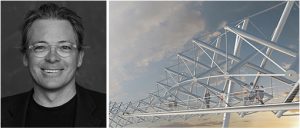
Phillip Anzalone is a Professor of Architectural Technology at the New York City College of Technology, where he teaches advanced design studio along with courses in contemporary building envelope design, digital fabrication and automated construction processes, and building structures. Phillip’s research includes the application of science and technology to architectural design problems in areas such as advanced materials, automated manufacturing and construction, active / responsive structural and building envelope systems, computational workflow and cyber-physical systems, augmented reality, building integrated machine learning, and innovative building systems. Phillip is a practicing Architect and Principal at Atelier Architecture 64, an award-winning firm in Brooklyn, New York with diverse expertise in building design based on an innovative practice focused on bridging material explorations and fabrication processes developed in the workshop with the specific needs of each project through environmental performance, architectural detailing and methods of manufacturing. Phillip holds a Masters of Architecture from Columbia University and B.P.S. Architecture from SUNY Buffalo, with past experience as a building envelope consultant for R. A. Heintges & Associates, as an architectural designer with Greg Lynn Form.
Bradley Cantrell | Harvard Graduate School of Design
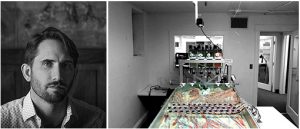
Bradley Cantrell is a landscape architect and scholar whose work focuses on the role of computation and media in environmental and ecological design. Professor Cantrell received his BSLA from the University of Kentucky and his MLA from the Harvard Graduate School of Design. He is currently an Associate Professor of Landscape Architectural Technology and a researcher in the Responsive Environments and Artifacts Lab at the Harvard Graduate School of Design. His work points to a series of methodologies that develop modes of modeling, simulation, and embedded computation that express and engage the complexity of overlapping physical, cultural, and economic systems.
Dana Cupkova | Carnegie Mellon University | Epiphyte Lab
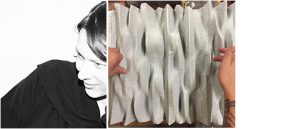
Dana Cupkova is a founding partner and principal of EPIPHYTE Lab, an interdisciplinary design and research practice. She currently holds Assistant Professorship at Carnegie Mellon University’s School of Architecture and serves as a Track Chair for the school’s Master of Science in Sustainable Design program. Dana’s design work studies the built environment at the intersection of ecology, computational processes, and systems analysis. In her research, she interrogates the relationship between design-space and ecology as it engages computational methods, thermodynamic processes, and experimentation with geometrically-driven performance logic. This research has been supported by the NYSCA 2013 Grant, the AIA NY Center for Architecture Foundation Arnold W. Brunner Grant, the Cornell University Faculty Innovation Grant, Architectural League of NY, AIA Urban and Regional Solution Grant, the Pennsylvania Infrastructure Technology Alliance Grant, and others. Dana’s design work has been published internationally in professional venues such as Dwell, The Architectural Review, Green Building & Design, The Cornell Journal of Architecture, IJAC and Architect’s Newspaper; it has also been presented at academic conferences such as Smart Geometry, ACADIA, Encoding Architecture, Sustaining Sustainability: Alternative Approaches in Urban Ecology and Architecture, and Design Modeling Symposium: Modeling Behavior, among others.
Nancy Diniz | Rensselaer Polytechnic Institute | Augmented Architectures
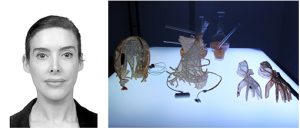
Nancy is a registered architect, educator and researcher, and currently the Director of the BSc in Building Sciences at the School of Architecture of Rensselaer Polytechnic Institute. Her main research and teaching interests lie in real time adaptive and responsive systems, mobile and wearable computing, bio materials and interface and data visualization. She has exhibited her work widely namely at EYEBEAM, Milano Expo 2015, Venice Biennale, Lisbon Architecture Triennale, ISEA, Dislocate and Cornell University. She was awarded a High Commendation Prize for Innovative Teaching, XJTLU Teaching Prizes 2014. She is a recipient of fellowships at the MacDowell Colony and EYEBEAM, NY. She is a research member of: ISTAR/IUL – Advanced Research Lab, Digital Living Spaces, Lisbon, Portugal, WSNL Wireless Sensor Network Lab at Xi’an Jiaotong-Liverpool University (XJTLU) Suzhou, China and the Center for Materials, Devices and Integrated Systems at the Rensselaer Polytechnic Institute, NY, USA. Nancy is the Founding Partner and Co-Principal of Augmented Architectures Studio based in Brooklyn, NY. In the past Nancy has held several permanent academic positions in Portugal, the UK and China.
Wendy W Fok | The New School / Parsons | WE-DESIGNS
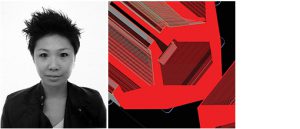
Wendy W Fok, a trained architect, is the creative director/founder of WE-DESIGNS, LLC (Architecture/Creative Strategy), Resilient Modular Systems (a Socially-Missioned Public Benefits Corporation), and atelier//studio-WF (Spatial/Installation Art). She is featured as Autodesk Remake’s list of 25 Women in Reality Computing (2017), winner of the Autodesk AiR (2016), Young CAADRIA Award (2015), Digital Kluge Fellowship awarded by the Library of Congress (2014/15), the Art Director’s Club of New York’s ADC Young Guns 11 Award (2013), AIA (American Institute of Architects) Dallas “Express Yourself” Women in Architecture Award (2013), and selected designer of the Perspective 40 under 40 Award (2011) and the Hong Kong Young Design Talent Award (2009). Fok has a Master of Architecture and Certification of Urban Policy/Planning from Princeton University, and a Bachelor of Arts in Architecture with a Concentration in Economics (Statistics) from Barnard College, Columbia University. Along with her practice, Fok is also a Assistant Professor of Integrated Design, at the Parsons School of Design Strategies, and completing her Doctor of Design at the Harvard University Graduate School of Design. The endeavours of Wendy W Fok’s research-based projects are dedicated to the creation of designs interlaced within the principals of procedural-based mathematics, logics, culture, and material studies, within the field of architecture, digital media, and design. Her designs are substantiated through explorations between the cross-pollination of spatial installation arts and novel architectural innovations embedded within international urban cityscapes.
Jason Kelly Johnson | California College of Arts | Future Cities Lab
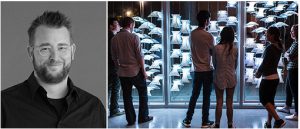
Jason Kelly Johnson is a founding design partner of Future Cities Lab, an experimental design and spatial research office based in San Francisco, California. Working in collaboration with his partner Nataly Gattegno, Jason has produced a range of award-winning projects exploring the intersections of public space, art and architecture with advanced fabrication technologies, robotics, responsive building systems. Future Cities Lab is at the forefront of exploring how advanced technologies, social media and the internet of things will profoundly affect how we live, work, communicate and play in the future. Their approach to design and making, which has been described as “high performance craft”, is also deeply experiential, interactive and materially rich. Jason is also a tenured Associate Professor at the California College of the Arts (CCA) in San Francisco and co-directs CCA’s Digital Craft Lab.
Carla Leitão | Rensselaer Polytechnic Institue | AUM Studio
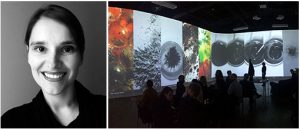
Architect, designer and writer, lives/works in New York, USA and Lisbon, Portugal. Co-founder of Umasideia in Lisbon, and AUM Studio in NY, with Ed Keller. Lecturer at at Rensselaer Polytechnic Institute School of Architecture. Formerly taught at Cornell University, City College and UPenn. Practice and academic endeavors focuses on convergences of Architecture/Design, Urban Phenomena, Ubiquitous Cultures, Digital Communication and the role of design in cultural and technological innovation. Research and forthcoming publication “Metamaterial: a Design Primer” engages the revolution of new thinking around material sciences, material and matter concepts and the role of designers in co-evolving structures and models for design of material specifications. Publications include “4 Lines” as author (ASS) and “City Fragments” (CBA) as co-editor. Curated, organized and designed the event “Portugal Now” and the Cornell AAP Folio of same event, exhibition of work by more than 20 portuguese offices and a conference in Ithaca and New York City with a selection of 5 offices. Practice includes built and ongoing residential and institutional projects. Exhibitions and installations include “Suture” (SCI Arc/Tellic Gallery, Los Angeles), Global Design NYU, and ISCTE, Portugal, and “True Romance” (Stuttgart, Germany).
Edward Keller | The New School / Parsons | AUM Studio
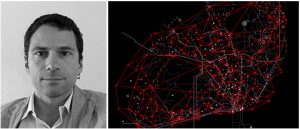
Director of the Center for Transformative Media at The New School, and Associate Professor at Parsons School of Design. Designer, professor, writer, musician and multimedia artist. Prior to joining Parsons, he taught at Columbia Univ. GSAPP[1998-2010] and SCIArc [2004-09]. With Carla Leitao he co-founded AUM Studio, an architecture and new media firm that has produced residential projects, competitions, and new media installations in Europe and the US. His work and writing has appeared widely, in venues including Punctum, Praxis, ANY, AD, Arquine, Leonardo Electronic Almanac, Architecture, Precis, Wired, Metropolis, Assemblage, Ottagono, and Progressive Architecture. He has spoken on architecture, film,technology and ecology internationally. Ongoing courses at Parsons include Design for this Century, Post-Planetary Design and The Radical Future of Guitar. Ed has been an avid rockclimber for over 35 years.
Frank Melendez | The City College of New York / CUNY | Augmented Architectures
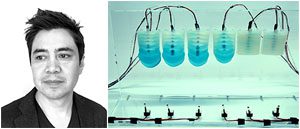
Frank Melendez is an architectural designer, researcher, and educator. His research and teaching focus on the advancement of architectural design through the integration of emerging digital technologies within the built environment. This work engages topics pertaining to computation, ecology, fabrication, synthetic materials, physical computing, and robotics. Frank is currently an Assistant Professor at The City College of New York, Bernard and Anne Spitzer School of Architecture, and is a Co-Principal of Augmented Architectures Studio, based in Brooklyn, New York. His professional experience includes working at Frank O. Gehry & Associates in Santa Monica, CA, and Urban A&O in New York, NY. Frank received his Bachelor of Architecture degree from the University of Arizona and a Master of Architecture degree from the Yale School of Architecture.
Rashida Ng | Temple University | SEAMLab
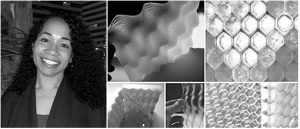
Rashida Ng is an Associate Professor and Chair of the Architecture Department at Temple University’s Tyler School of Art in Philadelphia. Her research broadly explores the measurable and experiential characteristics of materials and performative architecture. Professor Ng’s work consciously resists an over reliance on quantifiable metrics in direct acknowledgment of the primacy of human experience within architecture. Though rooted in the principles of building science, her research challenges conventional methods of construction and seeks to promote material invention and advancement within the field. Much of this research has focused on phase change material and advanced lighting technologies. She has authored numerous papers on these topics and co-edited the book, Performative Materials in Architecture and Design, published by Intellect in 2013. Professor Ng received a Master of Architecture from the University of Pennsylvania and Bachelor of Science in Architecture from the Georgia Institute of Technology. She is a registered architect in Pennsylvania. Prior to joining the faculty at Temple, she practiced in Georgia, Connecticut, and Pennsylvania. Professor Ng is Co-founder and President of the non-profit organization SEAMLab, a collaborative think tank dedicated to research and the dissemination of design-based knowledge focused on materiality within the built environment.
Shawn Rickenbacker | Tulane University and University of Pennsylvania | Urban Data Design
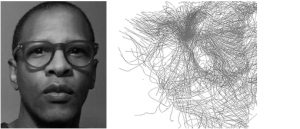
Shawn Rickenbacker is an architect and creative technologist whose work and research focuses on the convergence of digital and physical space and its relationship to human behavior and experience. He is a co-founder of the research and design consultancy, Urban Data + Design, which employs data, research and design toward the creation of useful algorithms and applications that provide quantitative and qualitative design insight. His professional and academic research seeks to advance the participatory role of technology and data in the invention of form, urban systems and policy. He currently holds the Favrot Visiting Chair at the Tulane University School of Architecture and is also a Senior Research Fellow at the Taylor Institute for Social Innovation and Design Thinking. Previously he served as the Director of the Motorola Futures Interaction Lab at the University of Pennsylvania, Graduate School of Design and organizer of the 2015 Non Discrete Architectures Symposium.
Michael Szivos | Pratt Institute and Yale University | SOFTlab
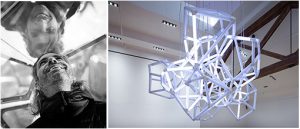
Michael Szivos is the founder of SOFTlab, a design studio based in New York City. The studio was created by Michael shortly after receiving a graduate degree in architecture from Columbia University. SOFTlab has won numerous awards including the Architectural League Prize for Young Architects & Designers in 2012, and New Practices New York awarded by the AIA Chapter of New York in 2010. The studio has designed and produced projects across almost every medium, from digitally fabricated large-scale sculpture to interactive design to immersive digital video installations. As a studio, SOFTlab embraces projects through a mix of research, craft, and ideas. Through the studio’s unique blend of backgrounds as designers, artists, architects and educators, we can approach every project from a fresh perspective to create rich visual, interactive and spatial experiences. By mixing research, creativity and technology with a strong desire to make work fun, SOFTlab attempts to create new and unique experiences. In addition to running SOFTlab, Michael also teaches core graduate design studio at Yale University and is an adjunct professor at Pratt Institute’s School of Architecture.
Organized by Frank Melendez | The City College of New York
Sciame Auditorium (Room 107)
141 Convent Avenue
New York, NY
40.8177595
-73.95047339999996













